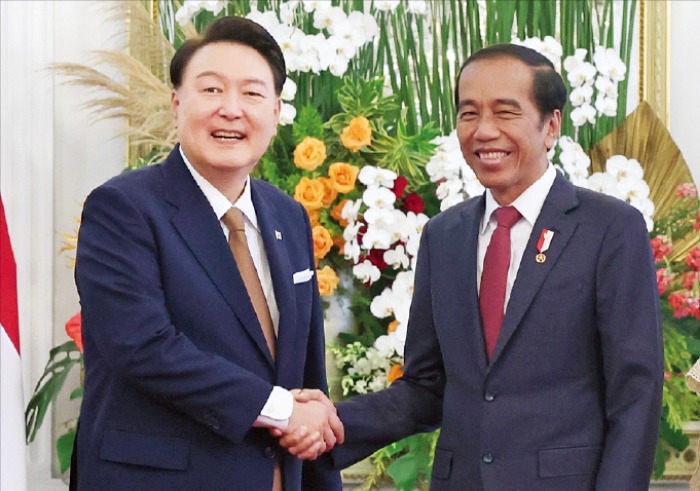JAKARTA, Indonesia — South Korea and Indonesia have affirmed their commitment to expanding the scope of business cooperation from high tech to food industries, including electric vehicles, batteries, bio, agricultural machinery, petrochemicals and steel, the South Korean presidential house said on Friday.
In a summit meeting held in Jakarta on Sept. 8, South Korean President Yoon Suk Yeol and his Indonesian counterpart Joko Widodo signed six memoranda of understanding for business cooperation, including creating an EV ecosystem and selling halal food.
Seoul is keen to ramp up exports to the Southeast Asian country, while securing core minerals for batteries from the resource-rich country on a stable basis.
In that regard, both leaders agreed to establish or improve regulatory systems that restrict shipments from one country to the other, including Indonesia’s import volume restrictions, certification systems and trademark infringement.
The bilateral meeting came as a Korea-Indonesia consortium led by LG Energy Solution Ltd. is preparing to break ground on a $9.8 billion battery plant in Indonesia this year. LX International Corp. and POSCO Future M Co. have joined the consortium.
But the project has been delayed since an MOU was signed in 2019.
Indonesia also has been overdue for its contribution to the 8.8 trillion won ($6.6 billion) joint fighter jet development program with South Korea.
About 2,000 Korean companies, including Hyundai Motor Co., POSCO Holdings Inc., and Lotte Chemical Corp., are operating in the largest EV market in Southeast Asia.
Hyundai Motor Group is producing EVs such as the IONIQ 5 at its Indonesia-based plant, which came online last year.
“Indonesia is realizing a clearly guaranteed rule of law based on liberal democracy and market economic order,” Yoon said during the summit. “We have no choice but to become a key partner country.”
The summit was held on the sidelines of Yoon’s state visit to Indonesia for the ASEAN summit 2023 and also came six months after both leaders sat down for a bilateral meeting in Hiroshima, Japan during the G7 summit in May.
This year, the two countries marked the 50th anniversary of the establishment of their diplomatic ties.
Indonesia boasts the world’s largest nickel reserves and is called a “key link in the electric vehicle supply chain” in the industry. It is also the largest country in ASEAN in terms of economic size, territory and population.
President Joko Widodo set the goal of becoming one of the world’s top five economies by 2045.
Hyundai Motor and LG Energy Solution are building their $1.1 billion joint battery plant near Jakarta.
AIRCRAFT, FOOD
The two leaders also agreed to successfully complete their 8.8-trillion-won fighter jet joint development project, for which Jakarta has not yet given a payment schedule to Seoul. The project, launched in 2015, is supposed to wrap up in 2026.
Regarding halal food, both countries will collaborate on technology sharing and certification-related information. Among other guidelines, halal food is prepared without pork or alcohol according to Islamic Sharia law.
Korean food companies are keen to sell their products to the world’s largest Muslim country, riding on the wave of Korean culture’s popularity there.
The two leaders also discussed ways for Korean companies to participate in the 40-trillion-won Indonesian capital relocation project. Indonesia plans to move the capital from Jakarta to East Kalimantan by 2045.
Trade volume between South Korea and Indonesia reached $26 billion in 2022, approximately doubling from 2020. Compared to 1973, the first year of their diplomatic relations, that volume has grown 130 times.
Write to Hyung-Joo Oh at ohj@hankyung.com
Yeonhee Kim edited this article.

